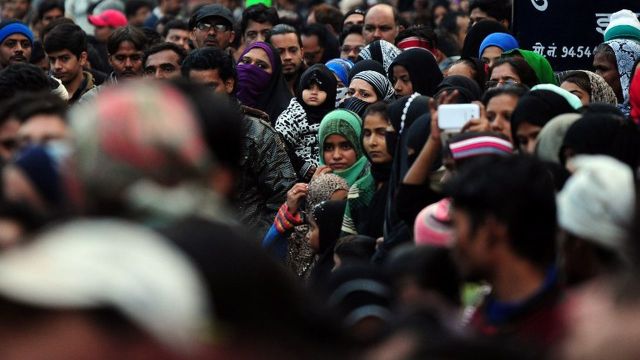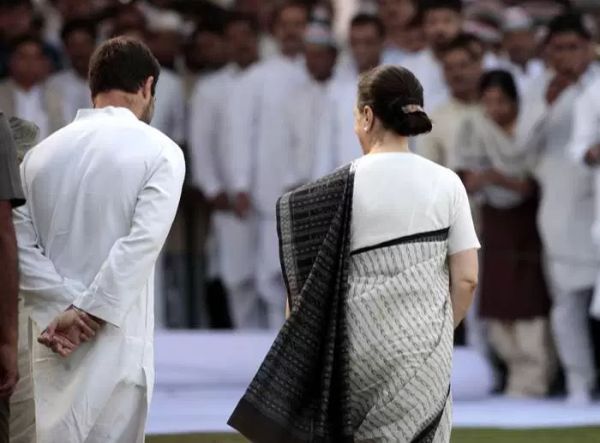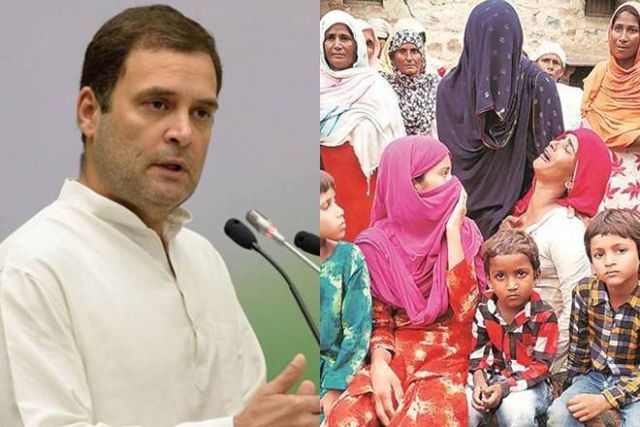
by admin | May 25, 2021 | News, Politics
 New Delhi : The government on Saturday accused the Congress, its President Rahul Gandhi and UPA Chairperson Sonia Gandhi of betraying Muslim women by thwarting the passage of the triple talaq bill in the Rajya Sabha, and appealed to women organisations across the country to start a peaceful agitation against the Opposition to create moral pressure to pass the law.
New Delhi : The government on Saturday accused the Congress, its President Rahul Gandhi and UPA Chairperson Sonia Gandhi of betraying Muslim women by thwarting the passage of the triple talaq bill in the Rajya Sabha, and appealed to women organisations across the country to start a peaceful agitation against the Opposition to create moral pressure to pass the law.
Addressing a press conference at the just-concluded monsoon session of Parliament, Parliamentary Affairs Minister Ananth Kumar said: “The government did three amendments in triple talaq bill. The question is why Congress, Rahul Gandhiji and Soniaji are trying to thwart the bill. Why are they trying to create obstacles?. By thwarting triple talaq bill, they betrayed our Muslim sisters”.
Raising questions over the conduct of the Congress and other opposition parties, he asked “when the bill was passed unanimously in Lok Sabha, then why are they trying to create hurdles in Rajya Sabha repeatedly”.
“I think, all the women organisations, the organisations who work for gender justice and crores of Muslim sisters should start a peaceful and non-violent agitation. They should create a moral pressure on Rahul Gandhi, Sonia Gandhi and other opposition (leaders) so that the triple talaq law could be passed expeditiously and the victim women could get protection,” Kumar said.
Referring to the amendments brought by the government in the bill, Kumar said only the victim woman and her blood relative can complain, the bail provision will be decided by the magistrate only after hearing the victim and the compensation will be decided by the court.
Talking about the session, he said the “most important thing of the session was that the no-confidence motion was defeated and the opposition was given a befitting reply that BJP, NDA and NDA+ are united. This was also proved with the election of Rajya Sabha Deputy Chairman.”
His deputy Vijay Goel also accused the Opposition of consciously creating difficulties in passing the triple talaq bill.
“We (Rajya Sabha) passed 14 bills in this session, including six ordinances. The triple talaq bill would have been passed if the Opposition had not created hurdles intentionally. The Opposition passed the bill in Lok Sabha but despite the amendments in it, they did not allow passage of it in Rajya Sabha,” he said.
Goel further said the session of Parliament was productive for the government with 21 bills passed by the Lok Sabha and 14 by the Rajya Sabha.
Calling it a “social justice” session, Goel said a social justice fortnight will be celebrated from August 15-30 to mark the passage of the bill giving constitutional status to the National Commission for Backward Classes and the SC-ST (Prevention of Atrocities) bill.
Goel said all the ministers will approach people in their homes in their constituencies and inform them about the bills passed by the government.
“The programme will be celebrated every year between August 1 and 9,” he added.
—IANS

by admin | May 25, 2021 | News, Politics
 New Delhi : Invoking one of the foremost writers of the early 20th century, Munshi Premchand, Congress President Rahul Gandhi on Friday said communalism — a constant point of reference in many of Premchand’s stories — envelops itself under the garb of culture.
New Delhi : Invoking one of the foremost writers of the early 20th century, Munshi Premchand, Congress President Rahul Gandhi on Friday said communalism — a constant point of reference in many of Premchand’s stories — envelops itself under the garb of culture.
Tweeting in Hindi to pay respect to Premchand, Gandhi said communalism – in an apparent reference to communal forces – was perhaps ashamed of presenting itself in its natural avatar.
Like the fabled donkey dressed in lion’s skin to lord over the jungle, communalism too wraps itself in the garb of culture, he said.
Gandhi’s point of reference was an oft cited essay on communalism and culture by Premchand, originally written in 1934.
The Congress President’s homage to Premchand came four days after the writer’s 138th birth anniversary when several events were held in the country.
—IANS

by admin | May 25, 2021 | Opinions, Politics
 By Amulya Ganguli,
By Amulya Ganguli,
After the hug and the wink, a step back. The Congress’s realisation, albeit belatedly, that Rahul Gandhi still does not have the gravitas required to become the prime minister will be generally welcomed. Evidently, the party is becoming more mature along with its president.
The retreat by Rahul Gandhi in favour of regional leaders will enable the opposition at the national level to focus more effectively on the issue, which is just as well because of the number of aspirants.
As the Rashtriya Janata Dal’s (RJD) Tejashwi Yadav has said, there are at least four in the fray (apart from Rahul) — Mamata Banerjee, Mayawati, Chandrababu Naidu and Sharad Pawar. Mercifully, no one takes Arvind Kejriwal’s name any more, not even the Delhi chief minister himself.
Of the four, the West Bengal chief minister and the former U.P. chief minister can be regarded as front-runners. Both have made their intentions clear and are trying, for each of their parties, to win as many Lok Sabha seats as possible to buttress their claims.
The Trinamool Congress leader’s aim is to win all the 42 parliamentary seats in West Bengal. Since her party has 34 at present, her expectations cannot be said to be too high. However, winning all the Lok Sabha constituencies will not be easy at a time when the Bharatiya Janata Party (BJP) is seemingly gaining ground because of the prevailing lawlessness in the state which was seen during the recent panchayat polls.
As for Mayawati, her desire to have a nationwide alliance with the Congress and not in Madhya Pradesh alone, as the latter wants, is obviously intended to widen the prospect of her outfit, the Bahujan Samaj Party (BSP), winning a fair number of seats. At present, the BSP has none in the Lok Sabha, but that is an oddity – a one-time failure which does not portend the future.
However, what the chasing of seats emphasises is the importance of the numbers game, which, of course, is the central feature of a parliamentary democracy.
In this respect, the Telugu Desam with 16 seats and the Nationalist Congress Party (NCP) with seven may be theoretically ahead of the BSP. But they have several disadvantages.
For a start, as a south Indian party, the Telugu Desam may find the going tough in a political milieu where north Indian parties tend to be well ahead of those from elsewhere in terms of the popular perception about their successful strike rate. The reasons are, first, their fluency in Hindi which is understood nearly all over India, and, secondly, because, historically, north Indian politicians have dominated the corridors of power in New Delhi.
There has been only one prime minister from the south — H.D. Deve Gowda of Karnataka — but for only 10 months. The Telugu Desam leader, Chandrababu Naidu, will be hoping against hope, therefore, if he thinks that it will be an easy ride to Delhi’s 7, Lok Kalyan Marg (formerly Race Course Road), which is the prime minister’s official residence.
The NCP’s Sharad Pawar is another claimant although he has never said so himself; nor has Naidu. But though now an elder statesman, the 78-year-old Pawar, who became chief minister of Maharashtra at the age of 38, and has held a number of major portfolios at the centre, is now past his prime.
That leaves the two women — Mamata Banerjee and Mayawati. Before considering their cases, it has to be remembered that the last word may not have been said about Rahul. If the Congress sweeps the Rajasthan and Madhya Pradesh assembly elections and does fairly well in Chhattisgarh, it would have overcome much of the ignominy of its present lowly status in the Lok Sabha with 48 seats and think of taking on the BJP almost on equal terms in 2019. Such a turn of events will make Rahul a serious contender once again.
The problem with Mamata Banerjee and Mayawati is that they do not have an across-the-board, pan-Indian appeal. Both are largely based in their own states — West Bengal and U.P. — with Mamata suffering from the added disadvantage of being less than fluent in Hindi.
Mayawati may attract the Dalit and Muslim votes, but how enthusiastic the backward castes and the upper castes will be at the national level is open to question. In U.P., the Samajwadi Party leader, Akhilesh Yadav, may ensure that his ally, Mayawati, gets the backward caste votes, but she may face difficulties elsewhere because the Dalits and the backward castes have not always had the best of relations. The upper castes, of course, are even more opposed to the Dalits.
It is understandable, therefore, why the non-BJP parties have kept their options open about the prime ministerial candidate till after the elections. Their hope is that the numbers will be the decisive factor and make the choice for them. But there is also the need for those not in the running like Sonia Gandhi to play a mediatory role of the kind Jayaprakash Narayan and J.B. Kripalani played in 1977 to calm tempers and massage the egos.
(Amulya Ganguli is a political analyst. The views expressed are personal. He can be reached at amulyaganguli@gmail.com)
—IANS

by admin | May 25, 2021 | News, Politics
 New Delhi : Congress Presdient Rahul Gandhi on Monday said the latest lynching incident in Rajasthan’s Alwar represents Prime Minister Narendra Modi’s “brutal New India”. The incident came to light on Saturday.
New Delhi : Congress Presdient Rahul Gandhi on Monday said the latest lynching incident in Rajasthan’s Alwar represents Prime Minister Narendra Modi’s “brutal New India”. The incident came to light on Saturday.
“Policemen in Alwar took three hours to get a dying Rakbar Khan, the victim of a lynch mob, to a hospital just six km away. Why? They took a tea-break en route. This is Modi’s brutal ‘New India,” Gandhi said in a tweet, attaching a news report.
The ‘New India,’ the Congress chief alleged, is where “humanity is replaced with hatred and people are crushed and left to die.”
Gandhi’s remarks came soon after a news report claimed that the policemen, before taking the lynch victim to the hospital, stopped to take some refreshment.
—IANS

by admin | May 25, 2021 | News, Politics
 New Delhi : After tearing into the BJP-led government in his speech during the no confidence motion on Friday, Congress President Rahul Gandhi walked across to the ruling benches and hugged Prime Minister Narendra Modi, taking everyone in the Lok Sabha by surprise.
New Delhi : After tearing into the BJP-led government in his speech during the no confidence motion on Friday, Congress President Rahul Gandhi walked across to the ruling benches and hugged Prime Minister Narendra Modi, taking everyone in the Lok Sabha by surprise.
“I have not an iota of hatred or hard feelings against you. You hate me. You may call me Pappu, you can use a stream of expletives for me. But I don’t hate you or have even slightest of anger for you. I am the Congress,” Gandhi said at the end of his nearly 40-minute fiery speech.
Gandhi accused Modi of lying to the nation and making empty rhetoric “jumlas” to deceive the poor of the country. He also lashed out at the government and questioned Modi’s silence over women not feeling safe in the country and people from the minority communities being lynched.
Gandhi said the Prime Minister and BJP President Amit Shah were different type of politicians unlike those from the Congress.
“We are okay with winning and losing, staying in and out of power. But they cannot afford to lose power. They fear losing power. It is this fear that is turning into anger… But I will turn this anger into love because I am the Congress,” he said.
Resuming his speech after a brief adjournment, Gandhi said some opposition MPs congratulated him for speaking “really well’.
“I was surprised when your own members shook my hand and said, ‘you spoke really well’. This voice is also there within you. This voice doesn’t exist just within us. This Akali Dal leader (pointing towards Harsimrat Kaur) was looking at me and smiling. This feeling is there in the entire country. Our job is to connect these feelings.
“The entire opposition and a few people among you..together we are going to defeat the Prime Minister in the election.
“You may think there is anger, hatred in my heart for the prime minister. But, I want to say this from the bottom of my heart that I am very grateful to the Prime Minister, the BJP and the RSS. They made me understand the meaning of the Congress. They taught me the meaning of being a Hindustani.
“Hindustani means – one may say or do anything against you, one may tell a lie or abuse you or use a lathi against you, but you will show love towards them. Narendra Modi, the BJP and the RSS have taught me this. I would like thank you for this from the bottom of my heart.
“You taught me my religion, made me understand the meaning of Shivji, you made me understand the meaning of being a Hindu. I want to thank you for this.
“This is the history of our country. You may have hatred and anger towards me. The Congress and this very feeling has built this nation. Don’t forget this. This feeling is there within all of you, and I will bring it out from all of you. I will bring out that love that is there within you and I will turn all of you into the Congress.”
Gandhi then walked across to the ruling benches and hugged Modi who was taken by surprise. The Congress leader was heard telling the Prime Minister to get up and allow him to do “pranaam” to him.
The Prime Minister was taken aback at first and gestured as if asking Gandhi why he was there. But the Congress President bent over, threw his arms around Modi and hugged him tight.
A visibly nonplussed Modi hugged him back. After recovering from an apparent shock moment, the Prime Minister called Gandhi back towards him and the two shook their hands. He patted Gandhi on his back and exchanged a word or two with him, smilingly.
As the opposition members gave Gandhi a standing ovation and thumped their desks, Speaker Sumitra Mahajan said such a conduct was against the rules of the House.
Shiromani Akali Dal MP Harsimrat Kaur Badal questioned Gandhi for saying she was smiling at him when he was speaking. “This is Parliament and not a ‘pappi jhappi’ area of Munna Bhai,” she said, mocking at him.
Speaker Mahajan said but “you were smiling” when Gandhi was speaking. There was a burst of laughter in the House.
By this time Gandhi had returned to his seat amid a loud cheer from his Congress colleagues. He was seen winking at Jyotiraditya Scindia, a Congress MP from Madhya Pradesh.
—IANS

 New Delhi : The government on Saturday accused the Congress, its President Rahul Gandhi and UPA Chairperson Sonia Gandhi of betraying Muslim women by thwarting the passage of the triple talaq bill in the Rajya Sabha, and appealed to women organisations across the country to start a peaceful agitation against the Opposition to create moral pressure to pass the law.
New Delhi : The government on Saturday accused the Congress, its President Rahul Gandhi and UPA Chairperson Sonia Gandhi of betraying Muslim women by thwarting the passage of the triple talaq bill in the Rajya Sabha, and appealed to women organisations across the country to start a peaceful agitation against the Opposition to create moral pressure to pass the law.



